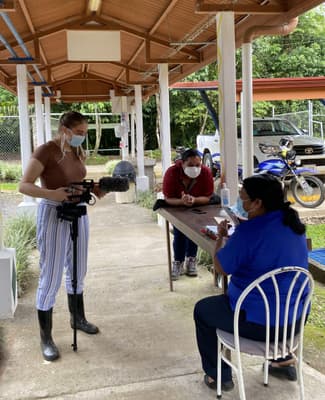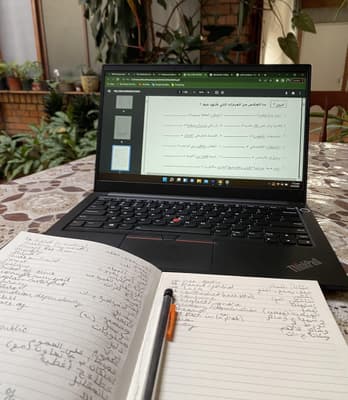What do snakes, public health and the Arabic language have in common? Ask CLS Arabic scholar Chloe Vasquez! Chloe is participating in CLS virtually from San Jose, Costa Rica while creating a documentary on snake bites and Costa Rica’s health response. When Chloe’s mom was bitten by a pit viper in October 2020, she dropped everything and flew to Costa Rica to be by her side. As she learned that snake bites are one of the most neglected tropical diseases, primarily affecting people with limited resources, Chloe began to develop a new interest in public health.

This summer, Chloe has met with agricultural workers, indigenous community leaders and herpetologists to learn why snake bite fatalities are significantly lower in Costa Rica than elsewhere in the world. Chloe recently sat down with CLS Communications Officer Rori DiFiore to share what she's been learning in Costa Rica and how she's connecting it to her CLS Arabic experience.
Chloe attends Macalester College in Saint Paul, Minnesota where she majors in Economics and Political Science. She hopes to one day combine her Arabic language skills and interest in herpetology and public health to find better treatment for snake bites and other diseases in North Africa and the Middle East.
Rori DiFiore: Where did your interest in learning about snake bites all begin?
Chloe Vasquez: A year and a half ago my mom was bitten by a snake in Costa Rica. I came to Costa Rica to take care of her and stay with her in the hospital. I was taking online classes and had been placed in a public health class because the class I’d originally wanted was full. I decided to do a project for my class on anti-venom. As I conducted research, I realized my mom was so lucky to be in Costa Rica and not somewhere else.
In most of the world, snakebites are a Grade A neglected tropical disease. The treatment of snakebites is often neglected because they typically impact rural agricultural workers who are usually on the margins of society. As I spoke to my mom's doctor and to local snake experts, I realized that Costa Rica did a phenomenal job addressing the situation. My mom got immediate and high-quality care and survived a deadly snake bite because of the health care system here.
So, this year, I applied and was accepted to make a documentary about why the story of snakebite in Costa Rica is different––why the system can support agricultural workers, tourists, and anyone who's bitten by a snake. I've been here about a month and a half, I've spoken to herpetologists, indigenous community leaders and agricultural workers. I work with the production facility, which is a part of the University of Costa Rica. I’ve traveled to a banana plantation in the south and spoken with indigenous communities. It's just been so cool. I've learned so much and I'm taking Arabic everywhere with me.

RD: What has it been like being in a Spanish-speaking environment while learning Arabic? I can imagine that could get tricky!
CV: Sometimes after a full day of three hours of Arabic courses and the rest of the day talking about immunology in Spanish—it can get a bit confusing! But I’m learning so much. There's also so much beauty and unexpected similarities that I’ve found between Spanish and Arabic. Many Spanish words came from Arabic. It’s always exciting. I also now make my presentations for CLS focused on topic areas that connect with my work here in Costa Rica.I even recently presented on the process for anti-venom production in Arabic!
RD: What made you gravitate toward learning Arabic?
CV: I started learning Arabic because I always had a dream of becoming a diplomat. My mom’s health scare became a pivotal moment for me. I realized that I love public health, I've always been interested in the STEM field, but I also care about people and want to engage with them. I thought that to help people I had to go through the career path of policy. Now, I realize I can combine my interests in public health, the Middle East and Africa, and even snakes! I’m considering a career path that would allow me to study Arabic and join the World Health Organization. I want to work towards a better treatment of snakebite in Sub Saharan Africa and North Africa. I want to work on the topics of envenomation and snake bites but also just public health in general. I have a reinvigorated purpose and drive to learn Arabic! It's been very exciting for me to refine the goal.

RD: How is CLS Arabic going?
CV: Over the last few weeks with my language partner, I’ve found myself going from very basic conversation to being able to cover more complicated topics. For example, today I spoke with him about the process of separating proteins and snake venom. Speaking in Arabic is becoming so much more natural. Being able to watch that progress in such a short amount of time. My teachers have been amazing, they're very understanding. At one point, I had no electricity. I sent them a message apologizing and letting them know there was no way I could make it to class. My teacher recorded it for me—they've just been so flexible. I feel really lucky that I've gotten to pursue Arabic and at the same time continue this other project that’s also important to me. It's been honestly amazing.
RD: I’d love to hear more about your language partner!
CV: My language partner's name is Salim, I love him. We are good friends now. I look forward to our meetings. Not only is my language ability improving dramatically but it is an opportunity to catch up with each other on what’s been going on in our lives. I feel like we have a real friendship. That’s the same feeling I have with everyone in my cohort. We have Monday night meetings where we just all do a Zoom call and talk about our lives and what we're up to. Even though I am participating in CLS virtually, there is still a strong sense of community.

RD: What’s next for you after CLS?
CV: In the fall, I am headed to Amman, Jordan to participate in an international relations and geopolitics program with SIT Study Abroad. I’m a rising junior, so I have two more years of undergraduate. In the future, I hope to pursue my master’s in public health or health economics. I’m hoping to learn about governance and international solutions to health problems. As we learned with the pandemic, health crises have no borders and impacts all of us. I hope to use my Spanish and Arabic language skills to help increase access to health care and provide holistic solutions to global health issues.
Want to see what other CLS students are up to this summer? Be sure to follow CLS on Instagram, Facebook and Twitter to see their stories!


